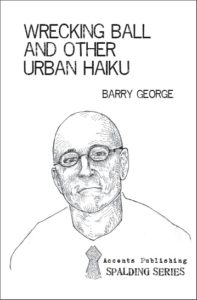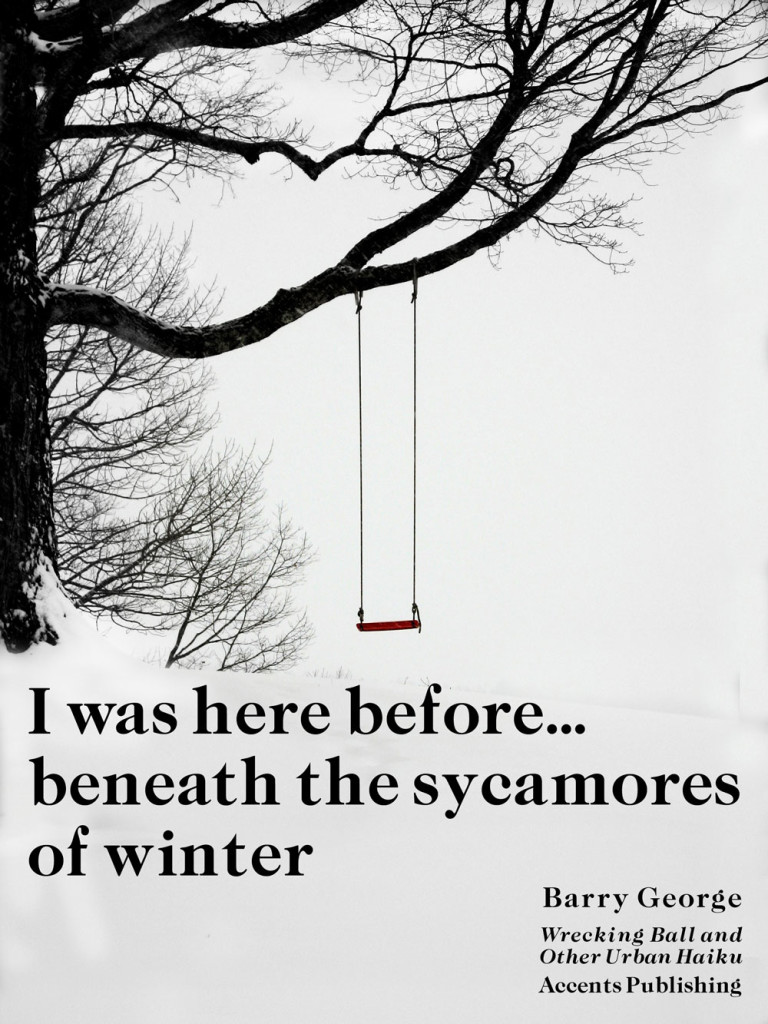Poet Barry George answers questions about Wrecking Ball and Other Urban Haiku (Accents Publishing, 2010)

Tell us the story of your Accents Publishing book(s).
At the time my book, Wrecking Ball and Other Urban Haiku, was published in 2010, I had just graduated from the Brief-Residency MFA program at Spalding University. I had been writing haiku for about fifteen years, and in the two years at Spalding had concentrated on studying and writing haiku, as well as tanka. Katerina Stoykova was a classmate of mine, and her ambition to start Accents coincided with my eagerness to have a book of haiku published. Most of the poems in Wrecking Ball are taken from my Creative Writing Thesis at Spalding. I remember that after assembling the longer thesis (which included haiku, tanka, and longer poems), the selection and ordering of the haiku for Wrecking Ball just kind of fell into place.
Do you still like it? Why or why not?
Yes. I still like the poems and the sequence in which they appear. It was my first chapbook, so it will always have a special meaning for me.
What is the highest praise you’ve received for it?
An important goal of mine is to write poetry that is enjoyed not only by other poets and poetry enthusiasts, but also by folks who don’t generally read contemporary poetry. So what I especially have valued are the comments I’ve received, from various people, that Wrecking Ball is a book they’ve kept close by on the nightstand, or on the coffee table or hair salon counter for themselves and their guests to read.
What didn’t make it in the book?
My only wish is that it could have been longer, that it could have included more poems. But I do like the spare format of only one haiku per page. And I feel fortunate that my Wrecking Ball haiku seemed to be well-suited for the first generation of Accents publications: in-house printed chapbooks sold at a popular price.
Is there a poem from the book you’d like to share with the readers of the Accents blog?
Since haiku are short, I would like to share a pair of them that represent two different stages of a related theme.
after the storm
he is rich in umbrellas—
the homeless man
older
wearing glasses now
the homeless man
How did you arrive at the title?
I wanted to emphasize that this was a collection of urban haiku, poems that adapt the traditional forms of haiku and senryu (haiku-like poems about human nature) to city life. One of the poems is about a “wrecking ball” that “swings in and out of darkness.” Since a wrecking ball is not usually what comes to mind when one thinks about haiku, I thought that image, as a title, would emphasize and draw attention to the somewhat unusual, even iconoclastic, nature of the urban-themed haiku.
Do you have a favorite Accents Publishing book (other than yours) and if so, which one?
I especially like Barbara Sabol’s Original Ruse for its playfulness and the variety of forms Barbara uses to develop different aspects of her theme.
What would you like to see Accents do going forward?
I would like to see Accents, in either its journal or published books, encourage experimentation with writing that considers the ways that our assumptions and perceptions about what it means to be human are, necessarily, changing in light of the climate emergency.
What are you working on now?
First, let me mention that I have something new coming out from Accents Publishing later this year!—a book of haiku called Sirens and Rain, which explores beyond Wrecking Ball the varieties of urban life in Philadelphia. Meanwhile, I am writing the haiku, senryu, and tanka that occur to me on my daily rounds—or, as often as not—in the middle of the night. I am most interested in finding poetic ways not merely to express an observation about “nature” or “human nature” as something separate from “me,” but to embody an intimation of my essential unity with other aspects of creation.
Share a poem, or at least a sentence from your new writing.
A tanka:
this river now
I’m falling through
what surfaces
I once considered
ice




